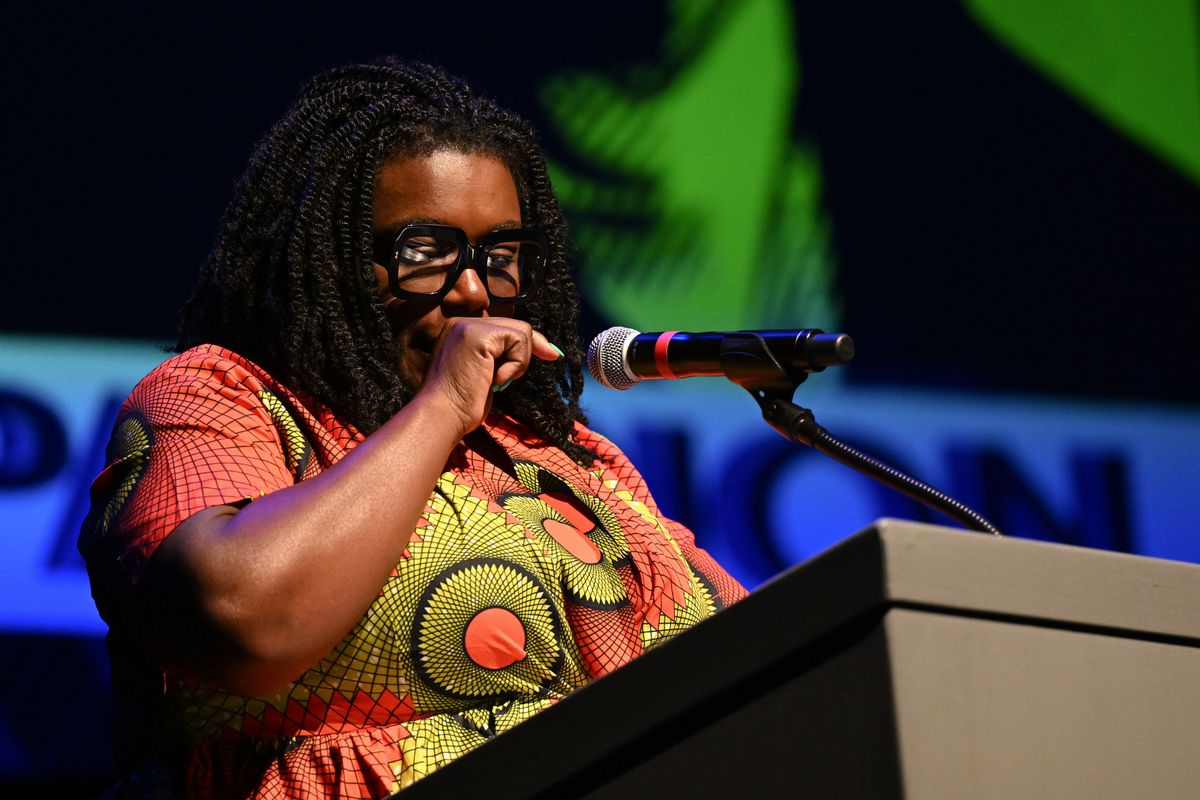Sandy Williams’ life and legacy, ‘radical empathy’ celebrated at Spokane memorial

Sandy Williams was a lot of things to a lot of people.
She was a community leader, activist, “radical,” “visionary,” “a fearless speaker of truth,” “matriarch,” mentor to many, a mother, daughter, sister and friend to all.
No matter what role she occupied or relationship she had with you, she exuded love, according to friends, colleagues and community leaders who celebrated Williams’ life and legacy on what would have been her 61st birthday Tuesday evening.
Williams and her partner, Patricia Hicks, were aboard a float plane that crashed Sept. 4 near Whidbey Island. Williams, Hicks and the other eight other people on board are presumed dead after the Coast Guard said no one could have survived the crash. Searchers have located one body and the plane.
Hundreds of community members gathered to cry, laugh, sing and mourn Williams at the First Interstate Center for the Arts.
The list of speakers and attendees included community leaders from across the region.
Betsy Wilkerson, a Spokane City Council member and chair of the Carl Maxey Center Board of Directors, opened the event calling her longtime friend a “visionary.”
“She was just a radical in the community,” Wilkerson said.
Toni Lodge said she helped mentor Williams in founding the Carl Maxey Center, having launched the Native Project herself. She said Williams “dreamed” the center into being.
Kiantha Duncan, president of the local chapter of the NAACP, thanked the Williams family for sharing Sandy with the community.
“We want you to know the community loves Sandy,” Duncan said to cheers from the audience.
Williams was “a fearless speaker of truth,” said Breean Beggs, Spokane City Council president.
Those sometimes hard truths were easier to stomach from Williams, whose “radical empathy” always shone through.
“She was an example to me,” Beggs said.
The speakers were punctuated with soulful music from Latrice Williams and Alethea Duncan, supported by a community choir. As the music washed over the crowd, emotions were visible. Tears were wiped away or followed by a comforting hug. Then the song turned joyous, prompting the audience to stand, clap and sway.
Dennis Cronin, a longtime Spokane attorney, and his wife, Theresa, unveiled a painting of Williams in her classic button-down shirt surrounded by a pastel cloud by local artist Jacob Johns. The new painting sat next to Johns’ painting of Carl Maxey.
Cronin challenged the audience to pick up Williams’ work and continue in her footsteps.
“Who is willing to carry the struggle forward?” he said. “Let liberty and equity proceed.”
Spokesman-Review editor Rob Curley told a story Williams had shared about how she wanted to take shop class in high school but girls weren’t allowed. So she wrote a letter to the principal and, not long after, she became the first girl to take shop class at Cheney High School.
She learned at that young age that “her words can make a change,” Curley said.
The Spokesman-Review partnered with the Black Lens, a Black community newspaper that was founded by Williams, numerous times in recent years.
“We are not going to let the Black Lens die,” Curley said.
He was met with a standing ovation.
Sylvia Brown, friend of Williams and board member at the Carl Maxey Center, shared how much Hicks complemented Williams. Hicks made sure the always-working Williams took time to dance and laugh, and helped carve out time for her partner to have for herself.
It’s a comfort to know that Hicks and Williams, who were companions in life, continued to be companions through death and beyond, Brown said.
Williams’ good heart was felt by all who knew her, however long.
In the back of the auditorium, Mary Anderson, 69, cried out in agreement. She sang, clapped, and cheered. Anderson moved to Spokane in April and met Williams at a church function.
She was immediately struck by her passion and began reading the Black Lens, cutting out her favorite stories to paste in scrapbooks she keeps for her grandkids.
“There is hope,” Anderson said, of continuing Williams work. “If we work toward it and love each other.”
Bevan Maxey, son of Carl Maxey, said Williams was “just trying to promote goodness.”
“And was tireless in doing it,” he said.
Wilhelmenia Smith-Williams, better known as “Grandma Willie,” was the last speaker to take the stage, fitting since she was the first to meet Williams, when she gave birth to her 61 years ago to the day.
She thanked the community for loving her daughter and supporting her work. She was tireless, working from before she got up, Smith-Williams said, with a smile.
Her daughter’s best ideas came early in the morning.
Smith-Williams asked the community to donate to the Carl Maxey Center, to volunteer and to keep her daughter’s legacy alive.
“Time is slow for those who are waiting. Too swift for those who fear. Too long for those who grieve, too short for those who rejoice,” Smith-Williams said. “But for those who love, time is eternity.”